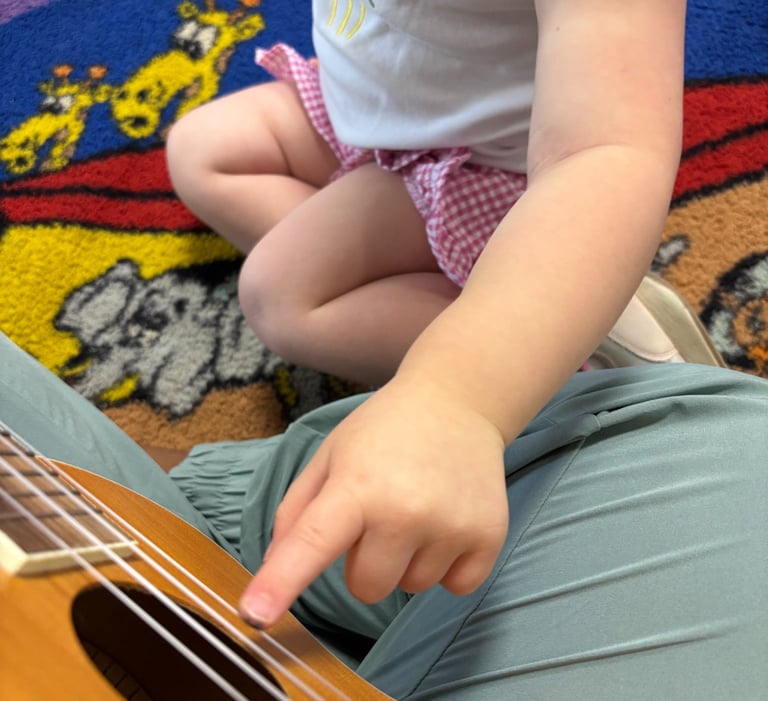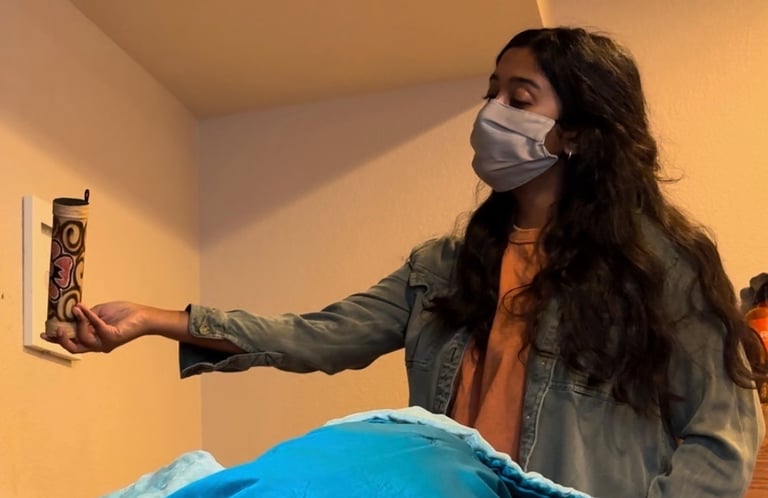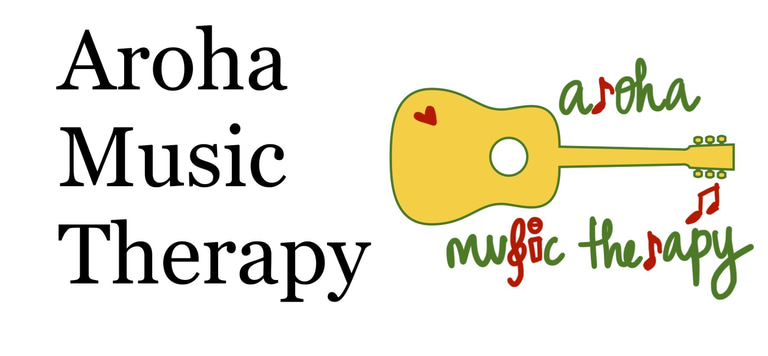Special Needs
At Aroha, we offer individual and group music therapy services for those with special needs. Music therapy can be an incredibly effective treatment for individuals with special needs. Our therapists can provide a supportive and creative outlet for communication, expression, and emotional well-being. In working with various individuals who fall under this category, music therapists at Aroha can help improve cognitive, communication, emotional, motor, sensory, and social skills.


Who can benefit from music therapy?
How can they benefit from services?
Attention-Deficit/Hyperactivity Disorder (ADHD): We can help individuals with ADHD focus, regulate attention, and develop impulse control. Music therapy provides a structured yet creative way to engage and redirect energy.
Autism Spectrum Disorder (ASD): We can help individuals with ASD develop communication skills, social interaction, emotional expression, and sensory integration. Techniques like structured music activities, improvisation, and rhythm exercises can help engage non-verbal individuals and reduce anxiety or overstimulation.
Cerebral Palsy or Motor Disabilities: In music therapy for those with motor disabilities and/or Cerebral Palsy, we can focus on improving coordination, movement, and physical control through activities like drumming, singing, and using assistive musical instruments.
Developmental Delays: We can stimulate cognitive, emotional, and social development, helping children with developmental delays to engage with their environment and express themselves more clearly.
Down Syndrome: We can support individuals with Down syndrome by improving cognitive function, motor skills, socialization, and emotional expression. Singing, playing instruments, and rhythm activities can be particularly beneficial.
Learning Disabilities: Children and adults with learning disabilities can benefit from music therapy as it enhances memory, concentration, and problem-solving skills. Musical patterns and structure can make it easier for clients to process and retain information.
Sensory Processing Disorders: Individuals with sensory processing difficulties often respond well to music therapy as it provides sensory input in a controlled, structured way. We can use music to stimulate or calm the senses, depending on the individual’s needs.
Behavioral and Emotional Regulation:
Music therapists structure sessions to provide stability for children, helping individuals manage anxiety, frustration, or aggressive behaviors. Using rhythmic patterns and preferred songs, we can promote relaxation and emotional regulation.Enhanced Cognitive Development:
We can facilitate interventions that help with memory, concentration, problem-solving, and language skills. For example, learning songs and rhythm patterns can reinforce learning in a fun and engaging way.Improved Communication Skills:
We can help those with limited verbal communication find new ways to express themselves, whether through singing, playing instruments, or rhythmic movement. We can also facilitate interventions to prompt speech initiation and improve expressive/receptive communication.Increased Social Interaction:
Group music therapy promotes social skills by encouraging collaboration, turn-taking, and shared experience. It also builds a sense of belonging and community.Motor Skill Development:
Playing instruments (drums, xylophones, keyboards, etc.) and engaging in rhythmic activities help develop fine and gross motor skills. In some cases, therapy can be adapted to include more assistive technology or adaptive instruments.Sensory Integration:
Music therapy can help clients with sensory processing issues by providing controlled sensory input, which may help them regulate their response to sights, sounds, and physical stimuli.
Music Therapy for Children/Youth


At Aroha, we offer individual and group music therapy services for children/youth. Music therapy for pediatric populations can be an effective approach to support children’s development, health, and well-being. Children respond to music in ways that promote cognitive growth, communication, emotional regulation, physical coordination, and social interaction. Pediatric music therapy is both engaging and therapeutic, providing a creative outlet for expression while addressing various developmental goals. For youth, music therapy can promote a sense of agency and they can express themselves musically, which might feel safer than expressing themselves using words. Youth music therapy services are available online, upon consultation.
Who can benefit from music therapy?
Music Enrichment:
Young children at Preschools/Montessoris can benefit from music therapy services to help meet their developmental milestones.
Behavioral and/or Mental Health Needs:
Music therapy provides a safe space for children to express feelings, process trauma, and reduce anxiety or aggression in a non-verbal, creative way.Chronic Illness or Hospitalized Children:
Children with chronic illnesses or those in the hospital (e.g., cancer, heart conditions) can benefit from music therapy for pain management, relaxation, and emotional support.Trauma or Grief:
Children who have experienced trauma or loss may benefit from music therapy as a means of processing emotions, reducing anxiety, and expressing grief in a safe and therapeutic setting.
How can they benefit from services?
Cognitive Development and Memory:
Songs, rhythm, and melodies help strengthen memory, attention, and concentration. Musical interventions and games enhance problem-solving skills and cognitive flexibility.Communication and Language Development:
Singing and playing instruments can encourage verbal communication and improve speech and language skills. Rhythmic patterns and melody are often easier for children to process, which can enhance articulation, vocabulary, and sentence structure.Emotional Expression and Regulation:
We can provide an outlet for children/youth to express their emotions, helping them manage feelings of anger, sadness, frustration, or fear. Music therapy also promotes emotional regulation, providing children with tools to calm themselves or reduce anxiety.Pain Management and Comfort:
For children in medical or hospital settings, music therapy can serve as a non-invasive form of pain relief, reducing stress and discomfort during medical procedures or treatment.Physical Coordination and Motor Skills:
Playing instruments (e.g., drumming, shaking maracas) or engaging in movement-based activities (e.g., dancing, clapping rhythms) helps improve fine and gross motor skills, hand-eye coordination, and physical strength.Social Skills and Interaction:
Group music therapy encourages children/youth to work together, share, take turns, and communicate with peers. It can also help them practice empathy and build connections with others in a safe and non-threatening way.Stress Reduction and Relaxation:
Using music therapy, we can help children/youth relax by using calming music or rhythmic activities that lower stress levels, reduce hyperactivity, and promote a sense of calm.
